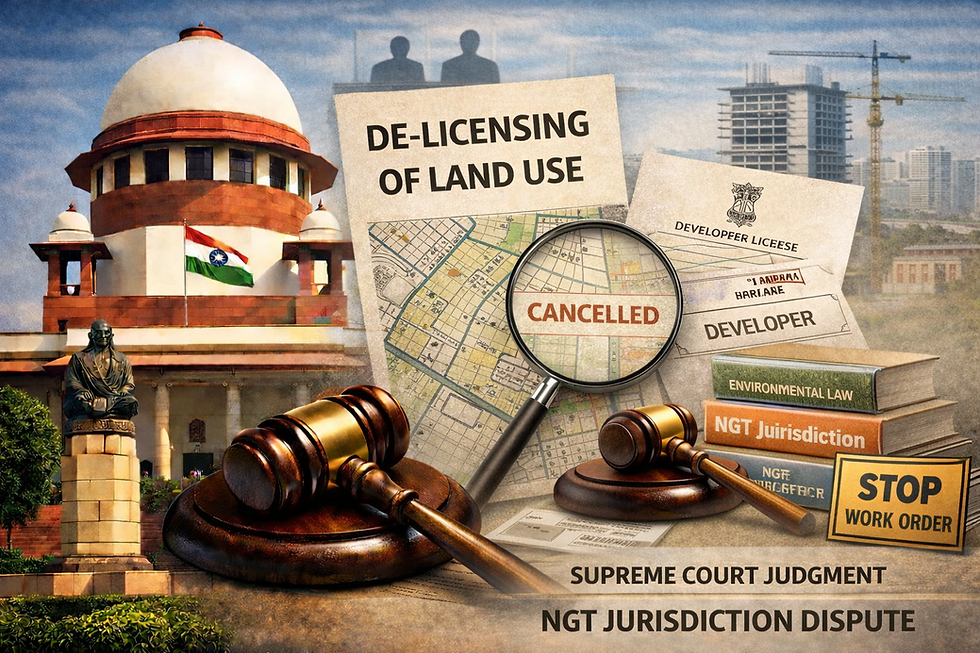Arbitration Aims to Provide Speedy Resolution: Supreme Court on Section 14(2) and Limitation
- Chintan Shah

- Jan 6, 2025
- 4 min read
Summary of the Judgment
Case Name: Krishna Devi @ Sabitri Devi (Rani) & M/s S.R. Engineering Construction v. Union of India & Ors.
Date: 3 January 2025
Judges: Hon’ble Justice Pamidighantam Sri Narasimha and Hon’ble Justice Sandeep Mehta
Advocates:
Ms. Madhusmita Bora (for the appellant),
Mr. Debojit Borkakati (for the respondents)
Acts and Sections Involved:
Arbitration Act, 1940 (Sections 14, 17, and 38),
Article 119(b) of the Limitation Act, 1963
Cited Judgements:
Nilkantha Sidramappa Ningashetti v. Kashinath Somanna Ningashetti, 1961 SCC OnLine SC 75
Deo Narain Choudhury v. Shree Narain Choudhury, (2000) 8 SCC 626
Ch. Ramalinga Reddy v. Superintending Engineer, (1999) 9 SCC 610
Food Corporation of India v. E. Kuttappan, (1993) 3 SCC 445
Indian Rayon Corporation Ltd. v. Raunaq and Co. (P) Ltd., (1988) 4 SCC 31
Bharat Coking Coal Ltd. v. C.K. Ahuja, 1995 Supp (1) SCC 744
Introduction
The case of Krishna Devi @ Sabitri Devi (Rani) v. Union of India & Ors. deals with a critical interpretation of the Arbitration Act, 1940, particularly regarding the starting point of limitation for filing objections to an arbitral award under Section 17. The judgment sheds light on the interplay between substantive compliance with legal provisions and procedural technicalities.
This article explores the factual background, legal issues, judicial reasoning, and the implications of this Supreme Court decision for arbitration law in India.
Background
This case revolves around the interpretation of Sections 14(2) and 17 of the Arbitration Act, 1940, and the timeline governing objections to an arbitral award under Article 119(b) of the Limitation Act, 1963. The appellant, Krishna Devi, acting as the legal heir of her late husband, sought enforcement of an arbitral award in her favour, while the respondents contested the timeline for filing objections.
The arbitral award, issued on 31 May 2022, directed the respondents to pay ₹1,33,47,268.92 along with 9% interest per annum. However, delays arose due to disputes regarding the arbitrator’s fees and the formal notice of the award.
Key Legal Issues
Date of Commencement for Limitation: Does the 30-day period for filing objections commence from the date of awareness about the award's filing, or only upon receipt of a formal notice as per Section 14(2) of the Arbitration Act, 1940?
Substantive vs. Procedural Compliance: Whether an informal awareness of the award suffices as notice for the limitation period under Section 14(2).
Judicial Reasoning
The Appellant's Stand
The appellant argued that the limitation period began on 21 September 2022, when the respondents were directed by the District Court to clear the arbitrator's fees. Citing Nilkantha Sidramappa Ningashetti, the appellant contended that formal notice was unnecessary if the respondents had clear awareness of the award's filing.
"The law does not require a formal notice of the making of the award, as against knowledge/notice of the award." – Hon'ble Justice Narasimha
The Respondents' Stand
The respondents claimed that the limitation period started on 18 November 2022, when the formal notice was issued by the District Court. They emphasised that procedural steps outlined in Section 14(2) and Article 119(b) should not be bypassed to ensure fairness.
Court's Observations
Hon’ble Justice Narasimha, delivering the judgement, underscored the balance between procedural compliance and the intent of the Arbitration Act to promote efficiency. The Court observed that the respondents were aware of the award's filing on 21 September 2022 and had ample opportunity to file objections within 30 days from that date.
The Court rejected the respondents' reliance on formal notice, referring to Food Corporation of India v. E. Kuttappan, where awareness of the award's filing, even through informal communication, was deemed sufficient.
"Insisting on procedural nuances despite substantive awareness would defeat the spirit of arbitration aimed at expeditious dispute resolution."
Substantive Compliance versus Procedural Formalities
Hon’ble Justice Pamidighantam Sri Narasimha, delivering the judgment, emphasised the need for a pragmatic approach in interpreting Section 14(2). Quoting Nilkantha Sidramappa Ningashetti, the Court reiterated that “the term ‘notice’ under Section 14(2) does not necessarily mandate a formal written communication. Knowledge through other credible means suffices.”
The respondents were informed on 21st September 2022 that clearing the arbitrator’s fees would enable them to receive the award. Despite this, they delayed payment until 18th November 2022. The Court held that the respondents were sufficiently aware of the award’s existence on 21st September 2022, triggering the limitation period.
Interpretation of Limitation Laws
The Supreme Court referred to Article 119(b) of the Limitation Act, 1963, which stipulates a 30-day period for filing objections post-service of notice of the award’s filing. In this case, the Court observed that “insisting on formal notices would grant undue leverage to parties seeking to delay proceedings, contrary to the spirit of arbitration law.”
Key Precedents and Their Application
Nilkantha Sidramappa Ningashetti: Established that formal notice is not mandatory; awareness suffices for Section 14(2). Applied to affirm the appellant's claim.
Indian Rayon Corporation Ltd.: Highlighted the substantive intent of Section 14(2), preventing delays by the award-debtor.
Bharat Coking Coal Ltd.: Reiterated that limitation begins with awareness of the award's filing, not the receipt of a copy.
Implications
This judgement reaffirms the principle that substantive compliance with Section 14(2) is sufficient to trigger limitation periods. Legal professionals must advise clients to act promptly upon becoming aware of arbitral awards, irrespective of formal notices.
Conclusion
The Supreme Court held that the limitation period began on 21 September 2022, rendering the objections filed by the respondents on 22 November 2022 invalid. The appellant's application under Section 17, filed on 10 November 2022, was deemed timely. The High Court's and District Court's rulings were overturned.
"A contrary interpretation would allow parties to exploit procedural gaps, undermining the integrity and efficiency of arbitration."



Comments